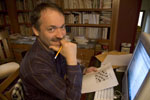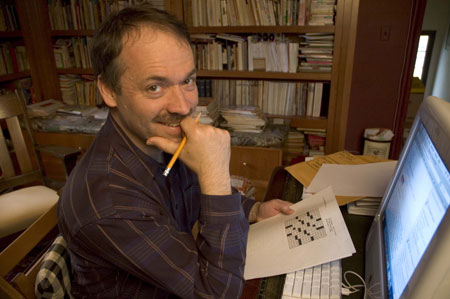Wordplay
 Crosswords… Crosswords… Does this sound like a fascinating subject for a documentary? Probably not. I’ve said this before—forgive me if it sounds redundant—but I’m growing more fascinated with documentaries every year. I feel like learning something about somebody or some people, or, in the case of “Wild Parrots of Telegraph Hill,” some birds—why not some nerds? I mean that in the most…
Crosswords… Crosswords… Does this sound like a fascinating subject for a documentary? Probably not. I’ve said this before—forgive me if it sounds redundant—but I’m growing more fascinated with documentaries every year. I feel like learning something about somebody or some people, or, in the case of “Wild Parrots of Telegraph Hill,” some birds—why not some nerds? I mean that in the most…

founder of the American Crossword Puzzle Tournament.
Crosswords… Crosswords… Does this sound like a fascinating subject for a documentary? Probably not. I’ve said this before—forgive me if it sounds redundant—but I’m growing more fascinated with documentaries every year. I feel like learning something about somebody or some people, or, in the case of “Wild Parrots of Telegraph Hill,” some birds—why not some nerds? I mean that in the most affectionate way, honestly.
The truth is, all kinds of people love crossword puzzles. Patrick Creadon has crafted a film that, despite some technical flubs (at times the soundtrack isn’t synchronized), captures the passionate labor of a cross-section of crossword fanatics, ranging from celebrities with average puzzle-solving skills—including Jon Stewart and Bill Clinton—to random nobodies who compete nationally at Will Shortz’ American Crossword Puzzle Tournament held annually at the Stamford Marriott since 1978.
Shortz is the editor of the New York Times crossword section and the featured “Puzzle Master” on NPR. In his youth, he dreamed about majoring in puzzles, and eventually crafted his own curriculum in Enigmatology. He enjoys reading hate mail of flustered readers. “This is both idiotic and completely unfair,” says one. I think I’ve read that before… in my hate mail. Shortz’ colleague, Merle Regal, notes that Will probably started the tournament as a way to socialize. The first tournament had 149 entrants, many of whom have returned for the past 27 years, including Miriam Raphael who won in 1979.
There are interviews with musicians that seem out of place at first, until it’s observed that musicians and engineers, and not English professors and historians, tend to be the most proficient at crossword puzzles. It never occurred to me that entire legions of puzzle-solvers could complete the majority of them in less than three minutes each. That was before I understood that they approach the puzzle much like one would approach a Rubik’s cube… as not merely a repository for words they don’t know, but as a multidimensional lock, a combination of letters which solves the puzzle.
That’s perhaps breaking it down to a level that might baffle most people, but not accomplished pianist Jon Delfin, whose proficiency at sight-reading sheet music (i.e. playing it on the first read through without prior rehearsal) was key in contributing to his ability to master the verbal origami involved in speed-puzzling. Says Delfin, “Give me spaces that need to be filled in and I’ll fill them in!” Nor does it seem to intimidate Ellen Ripstein, Tyler Hinman (at 20, one of the youngest competing), Al Sanders, Patrick Jordan or Trip Payne—all contestants in this year’s tournament. Interesting to note that, according to the Internet Movie Database, Trip Payne was also a contestant on “Who Wants to Be a Millionaire.” Not that I feel Regis Philbin or that albatross of a show need more publicity, but I wonder if Payne could put his skills to toppling Ken Jennings’ record on Jeopardy. He certainly seems capable.
Even though I write between 1500 and 6000 words a week, I don’t particularly become enthralled at the idea of sitting down to enjoy a good crossword puzzle—never have. But this documentary had my interest for several reasons. Clearly, Shortz’ tournament isn’t entirely about winning. There are no elimination rounds. Theoretically, if two of the three finalists finished the championship round in the same exact time, that would have to be regarded as a tie. I appreciated when the film took a break from competition suspense mode to show us how the Class C participants (in contrast to Class A’s like Payne, Jordan, Sanders, Hinman, etc.) were coming along, and not by downplaying their abilities. Frankly, they all impress me. Also, you gain an appreciation for what goes into the puzzle. The film takes you through the process of assembling and selecting puzzles for publication, and even a little bit of the psychology behind the scheduling. For example, the most challenging puzzles are best published on weekend editions.
The film doesn’t overtly explain why, but a reasonably thoughtful person would intuit, I suppose, that the weekenders have the largest reader base and consequently need to be challenging enough to engage a rather diverse range of intellect. In some ways, I don’t find such puzzles all that intellectual, especially if much of them can be solved, in principle, without even reading clues but by process of elimination. If one can skip any of the clues, then the heuristic involvement is somewhat llimited in comparison to, say, a critical analysis that requires cogent dissection of a number of facts—none of which can be ignored or resolved by process of elimination.
That being said, however, what I appreciate most is not what people are passionate about, but that they have a passion—about anything. So many aspects of our lives are mundane that just having some sort of passion, be it sci-fi movies, paintball, or crossword puzzles, means that people are taking time to engage themselves in more than merely subsistence. That demonstrates that there is culture left in the world, however awkward it may seem to fit crossword puzzles into the definition of “culture”—a construct that brings to mind everything from current debates about the state of film as art, to the philosophical schools of thought and debate in Greco-Roman, Egyptian and Indian cultures. But that is ultimately another point being made by the film. Trip Payne describes in one scene that he had to move to Ft. Lauderdale just to try to “escape the puzzle scene” of New York. Puzzle scene? The standard maintained by the New York Times has influenced so many other publications and periodicals around the world that—as with many other establishments of the Big Apple—this too, of all things, is a staple of our culture.
 Wordplay • Dolby® Digital surround sound in select theatres • Running Time: 94 minutes • MPAA Rating: PG for some language and mild thematic elements. • Distributed by IFC Films
Wordplay • Dolby® Digital surround sound in select theatres • Running Time: 94 minutes • MPAA Rating: PG for some language and mild thematic elements. • Distributed by IFC Films